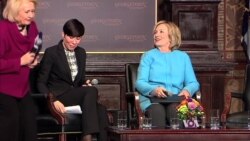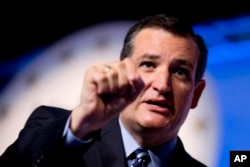In terms of Washington politics, we have entered what a lot of people like to call the “silly season.”
In the months to come there will be endless speculation as to who will make a run for president in 2016. There will be plenty of interest in both major parties since President Barack Obama is barred by law from seeking a third term.
This is the time for trial balloons, fits of fancy and the rather far-fetched notion that anyone of about two dozen potential White House contenders could become the next President of the United States on January 20, 2017.
So with that in mind I spent some of the week checking out two of the more likely serious contenders: former Secretary of State Hillary Clinton, the Democratic favorite, and Republican Senator Ted Cruz of Texas.
In the months ahead, on any given week, you will probably find one potential candidate or another giving a speech at a downtown hotel or hosting a fundraiser for a member of Congress.
In some ways they are kind of like off-Broadway tryouts to see how the crowd responds to you and what themes resonate. See if you can get the crowd to visualize one thing—could you see this person sitting in the Oval Office come 2017?
Clinton’s challenge
Hillary Clinton spoke recently at Georgetown University. The topic was increasing the role of women in war-making and peace-making situations. Let’s just say she carefully stuck to her script.
“Women are not just victims of conflict,” she said. “They are agents of peace and agents of change. We know when women participate in the peace processes, often overlooked issues like human rights, individual justice, national reconciliation and economic renewal are often brought to the forefront.”
The lecture hall was not filled to capacity. The expected question and answer session with students did not happen. Instead, the moderator read two questions that brought brief answers from Clinton. Then she departed the stage.
Later in the week, Clinton appeared at a women’s conference in Boston. She said the U.S. justice system is “out of balance” and expressed support for federal probes of the police-involved deaths of Michael Brown in Ferguson, Missouri, and Eric Garner in Staten Island, New York.
Clinton did not disclose anything about her presidential plans, but the Washington Post reported that she spoke in general terms about what it might be like to be president.
“Here’s what I worry about,” she said. “The stress on anybody in a leadership position, multiplied many times over to be president. The incoming never ends.”
Clinton events are known to be very closely controlled by her entourage.
Clinton supporters say they expect her to announce a decision on a presidential run no earlier than mid-February. She is in a bit of a tough spot at the moment. She is the runaway leader among Democrats for her party’s presidential nomination and she generally beats most of the possible Republican challengers as well.
Clinton is seen as the odds-on favorite, even more so than she was in 2008 when she lost to rookie Senator Barack Obama.
But some of her events seem to lack energy and she may have to find a way to counter the notion that she is a ‘president-in-waiting’ expecting to be handed her party’s nomination.
Democratic challengers
Clinton will have challengers.
One of them appears to be former Virginia Senator Jim Webb.
Webb has a strong military background and is more conservative than Clinton on some issues such as gun control. But he remains a fierce critic of her support for the Iraq War, something liberal Democrats also had a problem with in 2008.
Outgoing Maryland Governor Martin O’Malley and Vermont’s independent but left-leaning Senator Bernie Sanders are also considering a run in the Democratic primaries. Some Democrats have urged Massachusetts Senator Elizabeth Warren to run. But so far she says she is not interested.
But there are reasons why Clinton is the prohibitive favorite for the Democratic Party nomination. Many women activists in the Democratic Party are very excited by the prospect of Clinton making history as the first woman president. Some feel she was unfairly treated during the bitter primary battle with President Obama in 2008 and believe the party owes her the nomination for 2016.
If she runs, Clinton will stake much of her reputation on her tenure as secretary of state.
But longtime Democratic strategist Celinda Lake said she might consider ripping out a page from her husband’s political playbook concerning the domestic economy and working with Republicans where possible.
“Articulate tomorrow an economic vision for the country and say, just as Bill Clinton did, ‘we have done this but it is not good enough and we are going to work with Republicans to get these things done,’” Lake said.
Lake also believes Clinton as nominee would give the Democratic Party a huge advantage over whomever the Republicans wind up nominating in 2016. “If quality of candidate matters then I think Democrats are in very good shape because we have as our frontrunner Secretary Clinton, who is considered a supreme quality candidate by the voters.”
Wide open Republican field
The other audition I watched this week came from Republican Senator Ted Cruz of Texas, who seems a likely candidate in 2016.
Cruz was in campaign mode at a conference on foreign policy and national security at the Willard Hotel. Cruz is a huge favorite with Tea Party groups and unafraid to criticize Republican congressional leaders.
He is also making overtures to evangelical Christian voters, an important social conservative bloc within the Republican Party, and to Republicans who want to see a stronger U.S. foreign and national security policies.
“There is a reason why America has been called the indispensable nation,” Cruz said. “For the last six years what we have seen is we have seen America recede from leadership in the world. And that has created a vacuum and into that vacuum have stepped nations like Russia, like China, like Iran and it has not made the world a safer place. And I think there is a critical need, both at home and abroad, to restore America’s leadership in the world.”
Cruz also never misses an opportunity to remind voters that Hillary Clinton was a key architect of the Obama administration’s foreign policy.
“The failures of the Obama-Clinton foreign policy are manifest,” Cruz said. “It’s almost like the whole world is on fire right now. It seems there is not a portion of the world where security, where our relationship with our allies, where our ability to contain our enemies, to defeat our enemies, it seems there is not a region in the world where that hasn’t gotten worse.”
Cruz is one of about 20 or so Republicans who may or may not be thinking about running for president in 2016.
Mainstream Republicans are anxious to see whether former Florida Governor Jeb Bush and New Jersey Governor Chris Christie will run. Ohio Senator Rob Portman has already taken himself out of the running.
Cruz is a favorite in the Tea Party camp along with Kentucky Senator Rand Paul. Paul also has appeal to Republicans and some moderates who favor a libertarian view of government and society.
More than a dozen prominent Republicans are reportedly considering a presidential run in 2016 so look for a very crowded Republican field in two years, said John Fortier, an analyst with the Bipartisan Policy Center in Washington.
“The Republicans will have a large field of people and various wings of the party represented and it is a little unclear in that multi-candidate race how someone will emerge or who will emerge,” Fortier said. “On the Democratic side there is a clear frontrunner and that is Hillary Clinton.”
Fortier also said Clinton will have to take some steps to put some distance between herself and an unpopular President Obama.
“She seems to be already doing that in some ways and seems to be a little critical of the president in foreign policy and I think she will have to do that,” Fortier said. “She will also have to fend with the other candidates in the race as she did in 2008.”
But Republican pollster Whit Ayres countered that saying it and actually doing it are two different things.
“I will tell you that it is exceedingly difficult for one party to win three presidential elections in a row. History suggests that it is a very unusual event,” Ayres said. “It is going to be real tough for her to separate herself from an administration in which she served. Making the case that you are the candidate to follow an unpopular president for a third consecutive term for one party is going to be a very challenging case for her to make.”
Ayres also predicted a surge of Republican interest in their presidential field for 2016 following their near-sweep in this year’s congressional midterm elections in which they won back control of the U.S. Senate.
“The Republican Party is one candidate and one election away from resurrection at the presidential level,” Ayres said.







